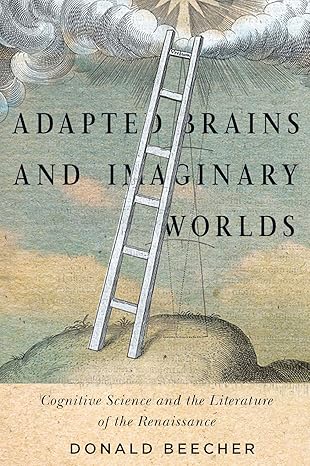
Adapted Brains and Imaginary Worlds:Cognitive Science and the Literature of the Renaissance
by: Donald Beecher (Author)
Publisher: McGill-Queen's University Press
Publication Date: 2016/2/26
Language: English
Print Length: 496 pages
ISBN-10: 0773546804
ISBN-13: 9780773546806
Book Description
In Adapted Brains and Imaginary Worlds, Donald Beecher explores the characteristics and idiosyncrasies of the brain as they affect the study of fiction. He builds upon insights from the cognitive sciences to explain how we actualize imaginary persons, read the clues to their intentional states, assess their representations of selfhood, and empathize with their felt experiences in imaginary environments. He considers how our own faculty of memory, in all its selective particularity and planned oblivion, becomes an increasingly significant dimension of the critical act, and how our own emotions become aggressive readers of literary experience, culminating in states which define the genres of literature. Beecher illustrates his points with examples from major works of the Renaissance period, including Dr Faustus, The Faerie Queene, Measure for Measure, The Yorkshire Tragedy, Menaphon, The Dialogue of Solomon and Marcolphus, and The Moral Philosophy of Doni. In this volume, studies in the science of mind come into their own in explaining the architectures of the brain that shape such emergent properties as empathy, suspense, curiosity, the formation of communities, gossip, rationalization, confabulation, and so much more that pertains to the behaviour of characters, the orientation of readers, and the construction of meaning. Discussing a breadth of topics ? from the mysteries of the criminal mind to the psychology of tears ? Adapted Brains and Imaginary Worlds is the most comprehensive work available on the study of fictional worlds and their relation to the constitution of the human brain.
About the Author
In Adapted Brains and Imaginary Worlds, Donald Beecher explores the characteristics and idiosyncrasies of the brain as they affect the study of fiction. He builds upon insights from the cognitive sciences to explain how we actualize imaginary persons, read the clues to their intentional states, assess their representations of selfhood, and empathize with their felt experiences in imaginary environments. He considers how our own faculty of memory, in all its selective particularity and planned oblivion, becomes an increasingly significant dimension of the critical act, and how our own emotions become aggressive readers of literary experience, culminating in states which define the genres of literature. Beecher illustrates his points with examples from major works of the Renaissance period, including Dr Faustus, The Faerie Queene, Measure for Measure, The Yorkshire Tragedy, Menaphon, The Dialogue of Solomon and Marcolphus, and The Moral Philosophy of Doni. In this volume, studies in the science of mind come into their own in explaining the architectures of the brain that shape such emergent properties as empathy, suspense, curiosity, the formation of communities, gossip, rationalization, confabulation, and so much more that pertains to the behaviour of characters, the orientation of readers, and the construction of meaning. Discussing a breadth of topics ? from the mysteries of the criminal mind to the psychology of tears ? Adapted Brains and Imaginary Worlds is the most comprehensive work available on the study of fictional worlds and their relation to the constitution of the human brain.
 Wow! eBook
Wow! eBook

